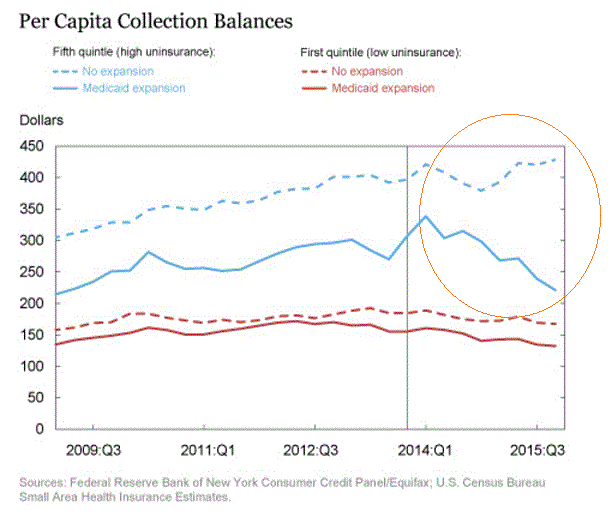U.S. States That Embraced Healthcare Reform Are Seeing Less Debt Sent to Collection Agencies
As long as their state embraced the Medicaid expansion.
Luke Kawa
June 7, 2016 — 10:18 AM EDT - Bloomberg
Early evidence suggests that the Affordable Care Act is working — at least in one important respect, according to researchers at the Federal Reserve Bank of New York.
Analysts Nicole Dussault, Maxim Pinkovskiy, and Basit Zafar state that the primary purpose of this law "is not to protect our health per se, but to protect our finances." And they've found a big difference between indebtedness trends in states that embraced the Medicaid expansion versus the ones that did not.
The analysts reason that the average amount of debt sent to collections agencies would tend to rise in the event that people without insurance required costly medical attention. Yet, U.S. counties that had a particularly high uninsured rate prior to the implementation of the Affordable Care Act have seen the per capita collection balance fall if their state embraced the Medicaid expansion. If not, the collection balance continued to climb:
This quintile of counties with the highest rates of uninsured saw the largest improvement in this metric following the Medicaid expansion. "The paths of these counties diverge after the first quarter of 2015," the analysts write.
The authors caution that this exercise only offers a partial analysis of the law's effects, as it focuses solely on possible benefits stemming from health care reform and does not take into account any of the costs.
"While the full effects of the Affordable Care Act on financial health are yet to be seen, and while the effects of the ACA — positive or negative — are not restricted to financial health, we offer suggestive early evidence that the Medicaid expansion is fulfilling the goal of health insurance: providing 'peace of mind' by protecting against financial hardship," they conclude.
